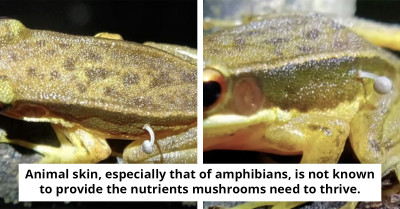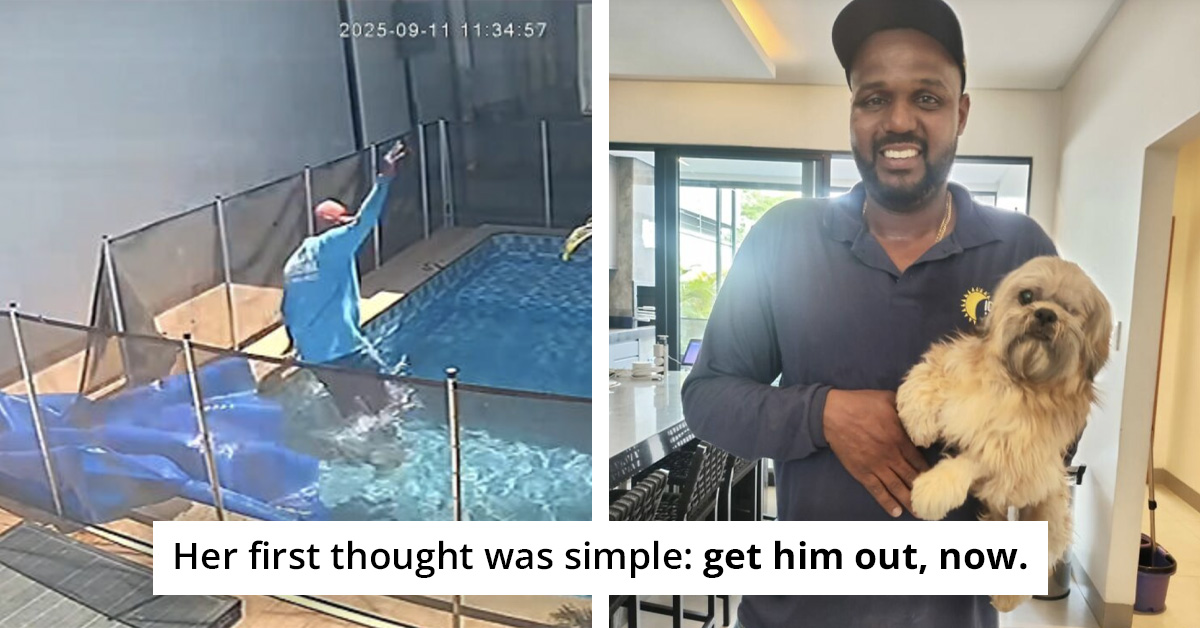Grieving Mother Lashes Out On Her Niece For Comparing Her Late Daughter To A Dog
Losing a child causes indescribable pain that only those who have experienced it can understand, as it is difficult to comprehend what losing a living part of yourself means. It's simply unnatural for parents to outlive their children because of all the hopes they have for a better life for their children—being happier, smarter, and more successful than they ever were.
When her beloved child died, a Reddit user found herself in this exact situation. AgreeableAffect7090, a Reddit user, lost her teenage daughter last year and is still deeply affected by the loss, finding it difficult to move on.
One night, her niece came over to stay with them, probably to comfort the grieving aunt. Her niece wanted to show her that she understood her, but the grieving mother lashed out at the teen for comparing her loss of a daughter to the teen's loss of a dog.
There was tension in the house, and her husband came out to intervene. In the end, he ordered an Uber for the niece to leave that night. It was a night not to be forgotten for her, and obviously, for her niece.
We have compiled snapshots from the original post. Scroll down to read how the entire event unfolded and what prompted the grieving lady to reach out to the AITA community for their candid opinion and what they had to say.

I have not been able to clean my daughter's room
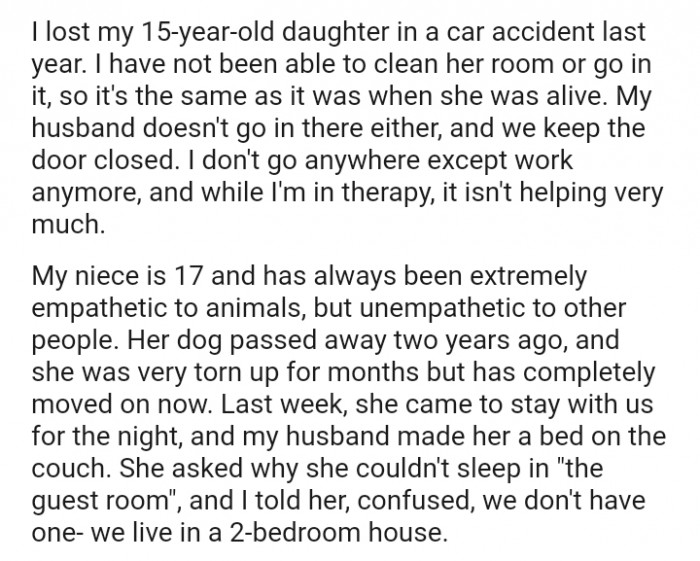
I felt she was completely out of line
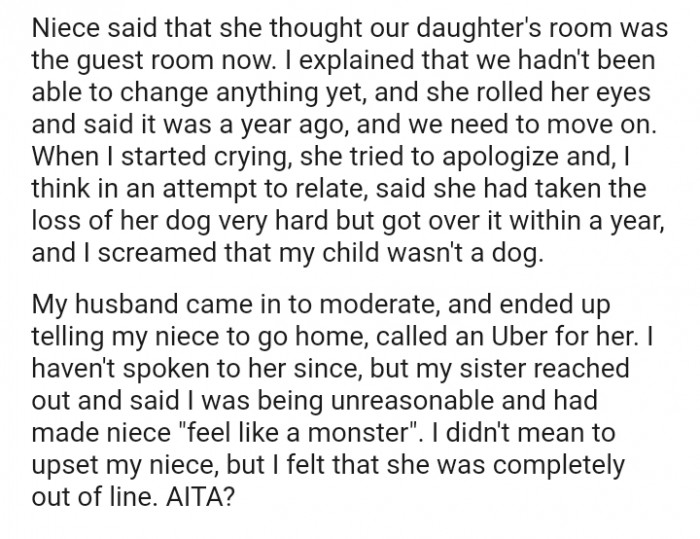
The Complexity of Grief
Grief is a multifaceted emotional experience that can provoke intense, sometimes unpredictable reactions. According to Dr. Alan Wolfelt, a prominent figure in the field of grief psychology, grief is not a linear process; rather, it often manifests as a series of waves, where feelings of sadness, anger, and confusion ebb and flow over time.
Research published in the journal Psychological Trauma: Theory, Research, Practice, and Policy indicates that individuals who experience complicated grief may be more prone to lash out at others, particularly in moments of heightened emotional vulnerability. This can happen when they perceive a threat to their emotional state, such as when someone makes a seemingly trivial comparison about their loss.
Understanding this complexity is crucial for family members, as it emphasizes the need for patience and empathy in the grieving process.
The Reddit thread was upvoted 11.1k times, with more than a thousand comments. Here are some of the most upvoted verdicts from Redditors.
1. This Redditor sympathizes with the OP

2. This is a learning point for your niece

3. You weren't able to cope in that moment
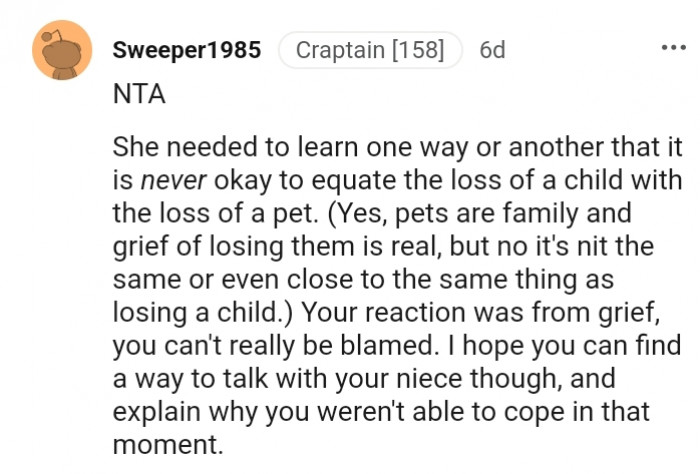
In instances of grief, emotional dysregulation can significantly affect interpersonal relationships. When feelings become overwhelming, individuals may not respond to others with the same understanding they would if they were not in pain. This is often compounded by societal expectations that people should 'move on' after a loss, which can lead to further isolation and misunderstandings.
Dr. Judith M. Stillion, a leading researcher in grief counseling, notes that individuals often feel pressured to suppress their emotions, which can lead to outbursts when they feel misunderstood or invalidated. Creating an environment that allows for open emotional expression can help mitigate these tensions.
4. Don't compare the loss of a child to a pet

5. Her initial heartlessness was absolutely vile

6. You cannot possibly understand the depth of sorrow
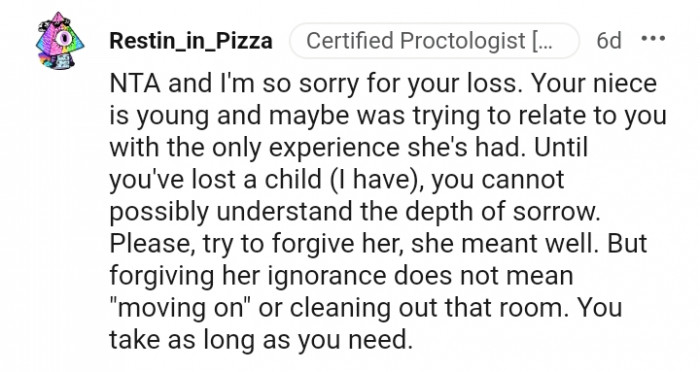
The Role of Empathy in Grieving
Empathy plays a critical role in how we support those who are grieving. Dr. Susan David, a renowned psychologist and author, emphasizes that "empathy is the foundation of connection and understanding in times of loss." When family members understand and validate the grieving person's feelings, it fosters a supportive atmosphere that can enhance healing. You can find more insights on her work at susandavid.com.
Moreover, cultivating empathy requires active listening and emotional presence, which can be challenging when family members are also navigating their own feelings of grief. Dr. John Gottman, a leading relationship researcher, notes that "listening with an open heart can bridge the emotional gaps that often widen during painful times." For more on his approach, visit gottman.com.
7. It's devastating and the experience is life changing
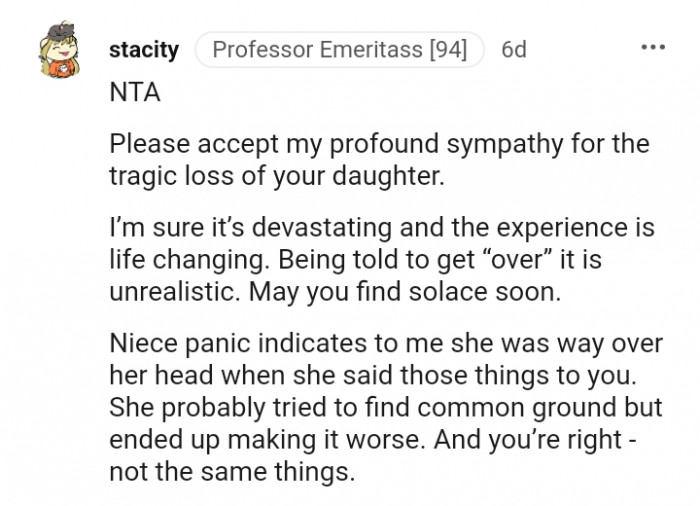
8. Your sister should not be defending it
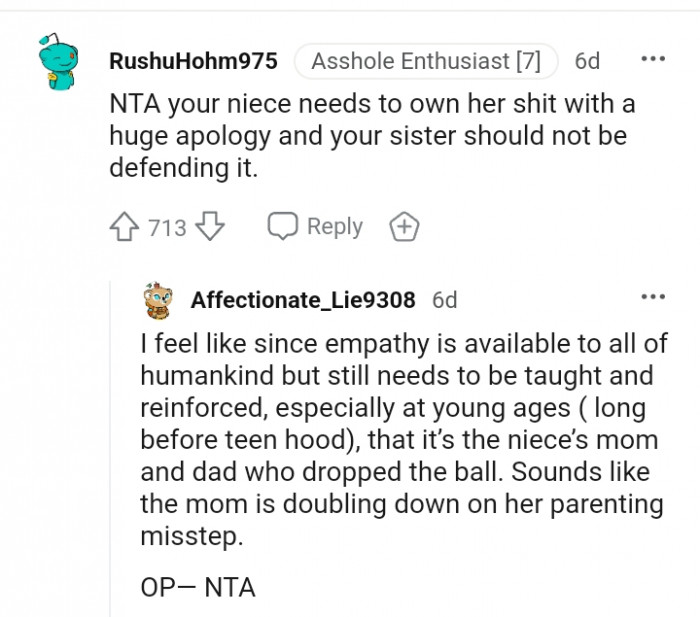
9. She's trying to relate to you with the closest experience she's known
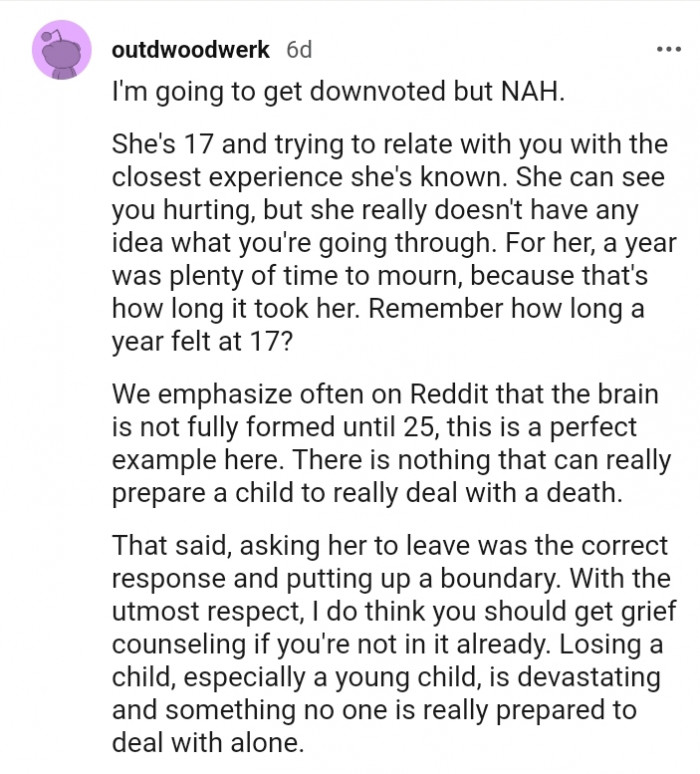
When examining the dynamics of grief, it’s essential to recognize the potential for miscommunication. Individuals may express their grief in different ways, and what feels trivial to one person can be deeply hurtful to another. Family members often need to ensure they communicate their intentions clearly and compassionately, especially when discussing sensitive topics.
Dr. John Gottman, a leading relationship researcher, emphasizes the importance of 'soft startups' in conversations, which involve approaching sensitive subjects gently and with care. By using this technique, family members can express their feelings without inadvertently triggering defensiveness in the grieving individual.
10. Your niece is obviously missing a chip

11. An important lesson was taught

12. She needs to learn some manners
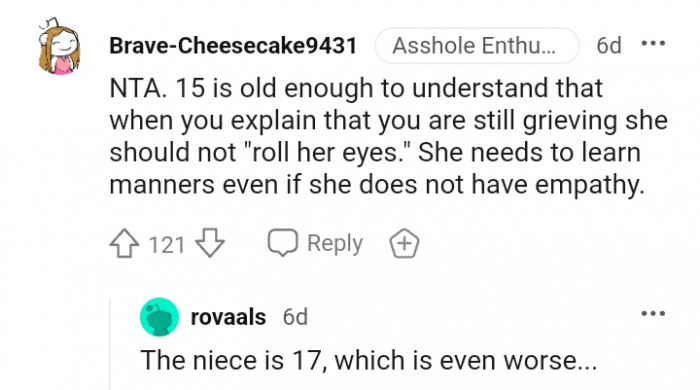
The Impact of Comparisons in Grief
Making comparisons, particularly involving a deceased loved one and a pet, can trigger strong reactions in grieving individuals. As Dr. Alexandra Solomon, a relationship therapist, notes, "Comparing a person to a pet can feel like an invalidation of the unique relationship that was shared, leading to heightened feelings of anger or sadness." Understanding this psychological phenomenon can help family members avoid unintentional missteps in conversation. Encouraging family discussions about loss that respect the individuality of the deceased can foster healthier emotional exchanges, as emphasized by Dr. Madeline Levine, a child psychologist who states, "Open dialogue about grief allows for a more compassionate understanding of each person's experience."
13. She feels like a monster because she said something monstrous

14. Your niece said something extraordinarily stupid
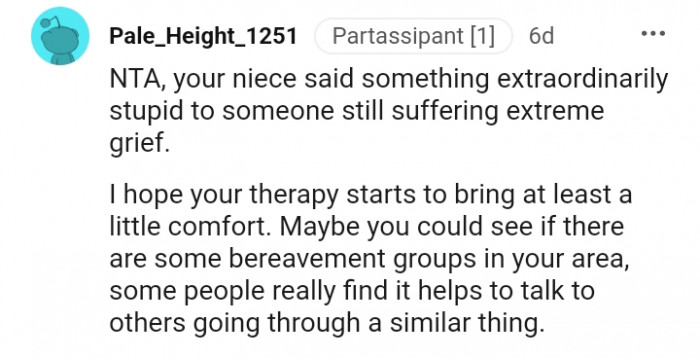
15. She was trying to connect the only way she could
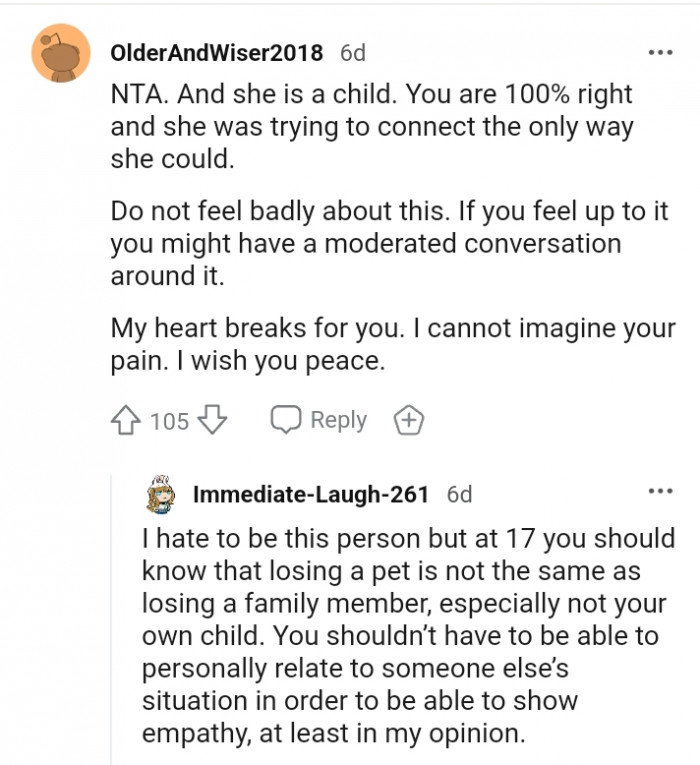
Practical strategies for navigating grief within family dynamics include establishing clear boundaries for emotional discussions. According to Dr. Terri Orbuch, a relationship researcher, "Creating designated times for family members to express their feelings can foster a supportive environment." She emphasizes that while open discussions about grief can be healing, it is crucial to set guidelines to avoid emotional overwhelm. Encouraging family members to share their feelings at specific times can create a safe space for grief and prevent accidental hurt during everyday interactions. This proactive approach can help family members feel more connected and less isolated in their grief experiences.
16. Why your niece felt like a monster...

17. She was upset she was sleeping on the couch
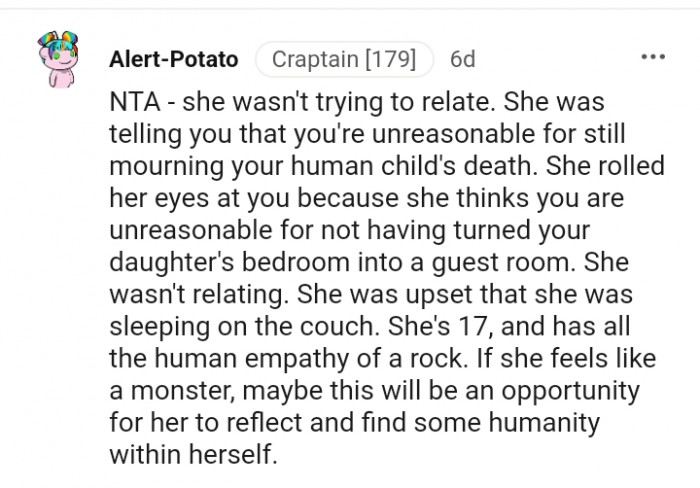
18. Comparing people to animals seems odd
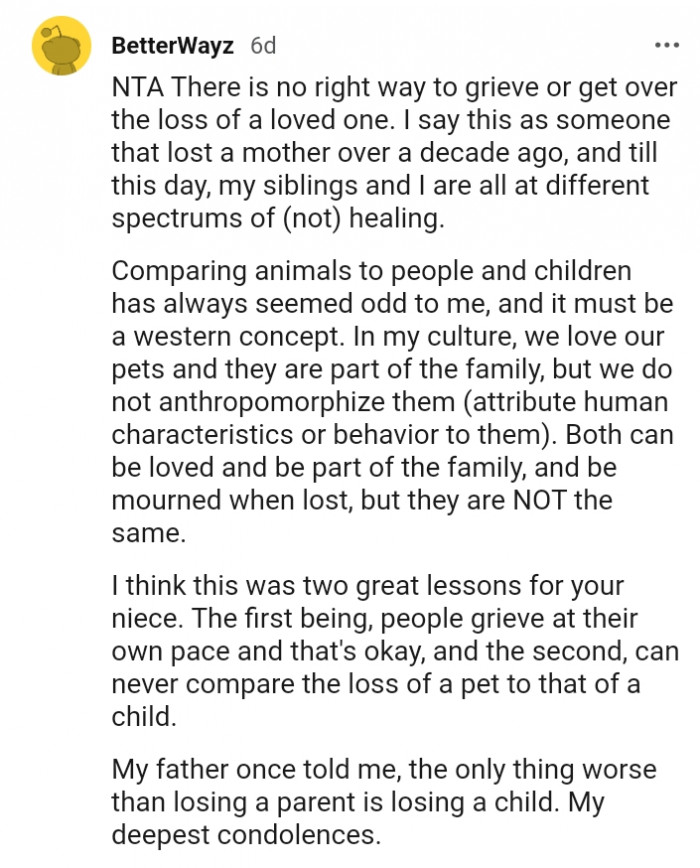
Healing Through Understanding
Ultimately, the journey through grief is deeply personal and often fraught with emotional turbulence. Research in grief psychology, particularly studies around post-traumatic growth, indicates that individuals can emerge from their grief more resilient and with a deeper understanding of their emotional needs.
According to Dr. Richard Tedeschi, who has extensively studied post-traumatic growth, fostering a supportive environment that encourages open dialogue about grief can facilitate this growth. When family members commit to understanding each other’s grief experiences, they not only aid in healing but also build a stronger, more empathetic family unit.
19. I hope it gives you some comfort

20. Comparing losses is just a no, no

Here we are faced with a case of two people who haven’t fully recovered from their loss. It’s quite understandable for the woman to be livid with her niece, and it is also understandable for the teen girl to reference her dead cat.
But in the end, the only thing that will pave the way for them to forget their losses and move on with their lives is time. Let us know your thoughts on this matter.
Psychological Analysis
This situation highlights how grief can cloud judgment and intensify emotions, often leading to explosive reactions. The grieving mother’s outburst likely stemmed from a deep sense of vulnerability and the feeling that her loss is being minimized, which is a common response when someone compares their grief to another's. It’s a reminder of the importance of empathy and sensitivity when discussing loss, as even well-intentioned comments can trigger strong emotions in those still processing their grief.
Analysis generated by AI
Grief, while profoundly personal, often resonates within family dynamics, revealing how interconnected our emotional experiences truly are. Understanding the complexities of grief, including emotional dysregulation and the importance of empathy, can create a foundation for healthier interactions among grieving family members. Research consistently shows that open communication and emotional validation are critical in fostering healing, suggesting that families who prioritize these elements can navigate their grief together more effectively.
Ultimately, the goal isn't just to endure the pain of loss but to emerge from it with a greater sense of connection and understanding, allowing each family member to honor their grief in their unique way while supporting one another through the journey.
